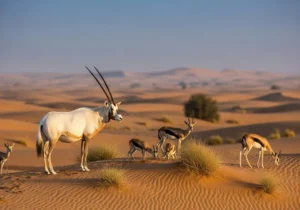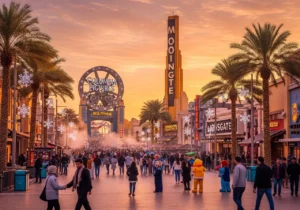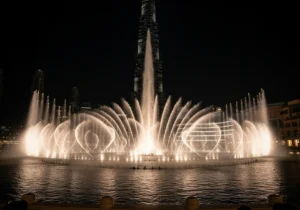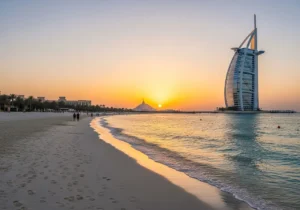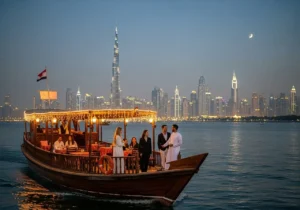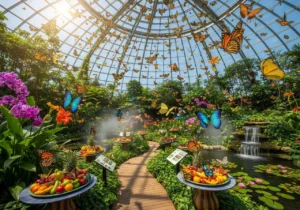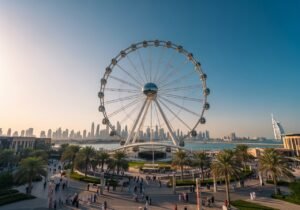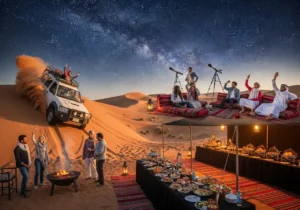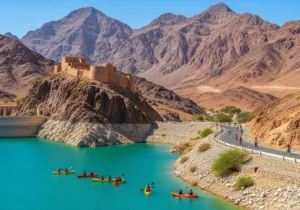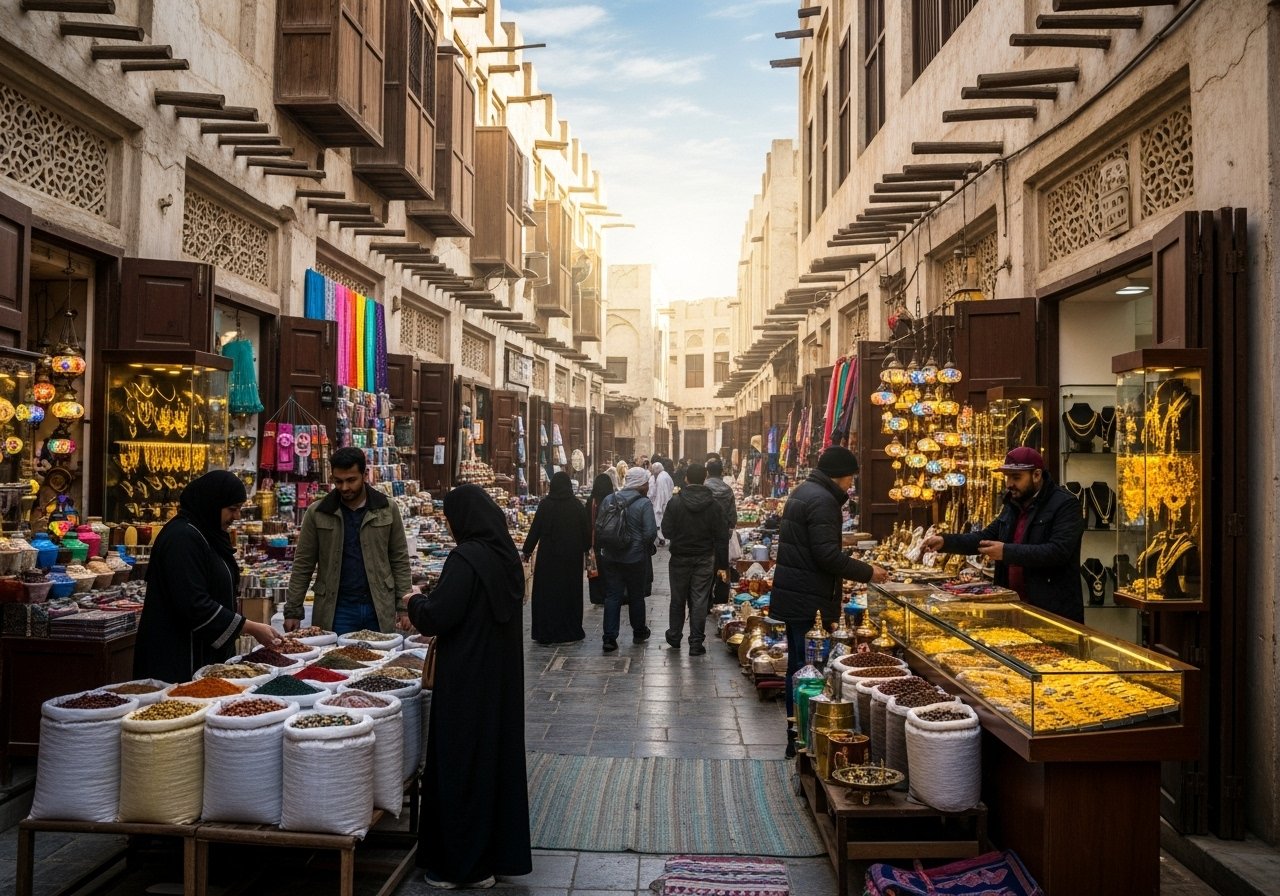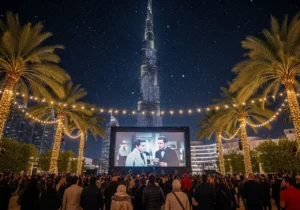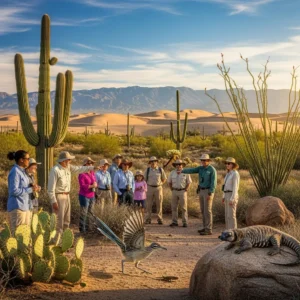Dubai Souks: A Vibrant Journey into the Heart of Old Dubai
Long before the world knew Dubai for its towering skyscrapers and lavish malls, the city’s lifeblood flowed through the bustling alleyways of its traditional markets. These are the Dubai Souks, a vibrant and chaotic tapestry of commerce, culture, and history that continues to thrive along the banks of the iconic Dubai Creek.
A visit to the Dubai Souks is a journey for the senses. It is the dazzling glitter of gold, the intoxicating aroma of exotic spices, the rich textures of silk and cashmere, and the constant hum of friendly bargaining. This is the authentic, beating heart of Old Dubai.
The pleasant and mild weather of the winter season offers the perfect climate to explore these historic, open-air markets on foot. This comprehensive guide will navigate you through the treasures of the Deira and Bur Dubai souks, ensuring you experience the very best of these traditional Arabian markets.
What Are the Dubai Souks? A Glimpse into a Merchant’s World
The Dubai Souks are a collection of specialized traditional markets that have been the center of the city’s trade for centuries. Located on opposite sides of the Dubai Creek, they represent the historical commercial core of the emirate. This is where merchants from across the region and beyond would come to trade their goods.
The Deira side is famously home to the Gold, Spice, and Perfume Souks, while the Bur Dubai side hosts the historic Textile Souk. The atmosphere here is a world away from the air-conditioned polish of modern malls. It is a place of energy, tradition, and human connection.
Exploring the Dubai Souks is one of the most essential winter activities Dubai has to offer. The cool breeze from the creek makes for a comfortable and enjoyable walk as you delve into this incredible piece of living history. These markets are not just tourist attractions; they are active, functioning marketplaces where locals still shop, and the age-old art of trade is alive and well in the Dubai Souks.
The Deira Side: Treasures of Gold, Spices, and Perfumes
The Deira side of the creek is a treasure trove of precious and aromatic goods. A walk through its bustling alleyways is an unforgettable experience, offering a glimpse into the commodities that have defined Arabian trade for generations. The Dubai Souks on this side are legendary.
The Dazzling Dubai Gold Souk: A City of Gold
Prepare to be mesmerized. The Gold Souk Deira is arguably the most famous of all the Dubai Souks. It is a dazzling labyrinth of covered walkways with hundreds of retailers showcasing window displays overflowing with gold jewelry.
The sheer volume and variety are staggering. You will find everything from delicate necklaces and intricate bracelets to heavy, ornate bridal sets. The gold comes in various karats (24K, 22K, 21K, and 18K) and colors, including yellow, white, and rose gold.
Shopping for Gold: Buying from the Gold Souk Deira is a secure and regulated process. The price of gold items is composed of two parts: the fixed daily market rate for the gold’s weight and the craftsmanship charge, which is the negotiable part. Always check the current market rate, displayed on screens throughout the souk, before you start bargaining.
Even if you are not planning to buy anything, a walk through this glittering wonderland is an essential part of visiting the Dubai Souks. It is a testament to the city’s nickname, the “City of Gold.”
The Aromatic Dubai Spice Souk: A Feast for the Senses
Just a short walk from the Gold Souk lies a market that will captivate your sense of smell: the Spice Souk Dubai. As you enter, the air becomes thick with the rich, earthy aromas of hundreds of different spices, herbs, and incenses.
The shops are a kaleidoscope of color, with large burlap sacks and wooden barrels overflowing with their contents. You will find mounds of vibrant turmeric, deep red paprika, and fragrant cinnamon sticks. The souk is particularly famous for its high-quality saffron from Iran and its aromatic frankincense from Oman.
Beyond spices, the Spice Souk Dubai is a great place to buy other local delicacies. You can find a wide variety of dried fruits, nuts, sticky dates, and exotic teas. It is a fantastic place to pick up authentic and flavorful souvenirs from your trip to the Dubai Souks.
The Enchanting Dubai Perfume Souk: Scents of Arabia
Continuing your journey through the Deira markets, you will discover the Perfume Souk on Sikkat Al Khail Road. This area is dedicated to the art of traditional Arabic perfumery. Here, the air is filled with the deep, complex scents of Oud, amber, musk, and rose.
The shops sell everything from pure perfume oils, known as attars, to incense in the form of bakhoor and solid perfume blocks. Unlike Western perfumes that are alcohol-based, traditional attars are oil-based, meaning their scent lasts much longer on the skin.
One of the most unique experiences in this part of the Dubai Souks is the opportunity to have a custom fragrance created just for you. A skilled perfumer can blend different oils to create a signature scent that perfectly matches your personality.
Crossing the Creek: The Abra Ride, a Journey in Itself
Connecting the Deira and Bur Dubai sides of the creek is the city’s most charming and historic mode of transport: the Abra. These are traditional wooden water taxis that have been ferrying people across the creek for decades.
A Dubai Creek abra ride is an essential part of the souk experience. For the incredibly low price of just one or two dirhams, you can enjoy a short but scenic journey across the bustling waterway. It is the best way to travel between the Deira and Bur Dubai souks.
From the water, you get a fantastic view of the juxtaposition of old and new Dubai. You will see traditional wooden dhows, still used for trade, set against a backdrop of modern glass buildings. This simple boat ride is a highlight of any tour of the Dubai Souks.
The Bur Dubai Side: Textiles and Historical Charm
After your Abra ride, you will arrive on the Bur Dubai side of the creek. This area has a slightly different, perhaps more laid-back, feel and is home to another one of the city’s most important traditional markets.
The Vibrant Dubai Textile Souk: A World of Fabrics
Located in the heart of the Old Dubai markets on the Bur Dubai side is the Textile Souk Bur Dubai. This covered market is a vibrant explosion of color, texture, and pattern. The narrow alleyways are lined with small shops draped in rolls of fabric from around the world.
Here, you can find an incredible variety of materials, including fine silks, soft cottons, luxurious cashmere, and delicate lace. It is a paradise for anyone interested in fashion or sewing. You can also purchase beautiful ready-made garments, from embroidered kaftans to colorful pashminas.
One of the best features of the Textile Souk Bur Dubai is the presence of numerous skilled tailors. You can select your favorite fabric, and a tailor can create a custom-made outfit for you, often within a day or two. This is a truly unique part of shopping in Old Dubai.
The Old Souk and its Wares
Adjacent to the Textile Souk is the area often referred to as the Old Souk. This market is a more eclectic mix of shops, selling everything from traditional footwear and souvenirs to household goods and toys. It has a distinctly local feel and is a great place to observe daily life.
Exploring this part of the Dubai Souks offers a different perspective. It is less specialized than the Gold or Spice Souks, but it provides an authentic glimpse into the city’s long-standing role as a trading hub.
The Art of Haggling: A Buyer’s Guide to the Dubai Souks
One of the most important and enjoyable aspects of shopping in Old Dubai is the practice of haggling, or bargaining. It is a cultural tradition and an expected part of the interaction between buyer and seller in the Dubai Souks.
A Simple Guide to Friendly Bargaining:
- Always be polite: Start with a smile and a friendly greeting.
- Never accept the first price: The initial price quoted is always an opening offer.
- Have a price in mind: Know what you are willing to pay for an item.
- Offer about half: As a starting point, you can offer around 50-60% of the initial asking price and negotiate from there.
- Be prepared to walk away: If you cannot agree on a price, politely thank the shopkeeper and walk away. They may call you back with a better offer.
- Use cash: You often have more bargaining power when you pay with cash.
Remember, haggling in Dubai is meant to be a fun and lighthearted exchange, not an aggressive confrontation.
Practical Tips for a Winter Souk Exploration
To make the most of your adventure in the Dubai Souks, a little planning can go a long way.
Essential Tips and Souk Timings
After immersing yourself in the historic Dubai Souks, you might want to experience the other side of Dubai’s heritage: the desert. For an unforgettable evening in the dunes, you can explore safari options at https://royaldesertadventures.ae/. For more comprehensive city and heritage tours, https://dubaidesertsafarie.com/ provides many packages. Another excellent planning resource is https://hafiztourism.com/.
Conclusion: An Unforgettable Sensory Experience
A visit to the Dubai Souks is a journey back to the very origins of the city. It is an experience that engages all your senses and connects you with a rich history of trade and tradition. These markets are a living, breathing part of the city’s identity.
In the perfect weather of a Dubai winter, there is no better adventure than to lose yourself in the glittering alleys of the Gold Souk, breathe in the aromas of the Spice Souk, and feel the rich textures of the Textile Souk. The Dubai Souks offer a timeless and authentic experience that is an essential part of any visit to this incredible city.
Frequently Asked Questions (FAQs)
1. What are the main souks to visit in Dubai? The four main and most famous of the Dubai Souks are the Gold Souk, Spice Souk, and Perfume Souk located on the Deira side of the Dubai Creek, and the Textile Souk on the Bur Dubai side.
2. What are the general opening hours for the Dubai Souks? Most shops in the Dubai Souks are open from approximately 10:00 AM to 10:00 PM, Saturday to Thursday. On Fridays, they usually open in the afternoon, around 4:00 PM. Many shops close for a break in the middle of the day, typically from 1:00 PM to 4:00 PM.
3. Is it safe to buy gold from the Gold Souk Deira? Yes, it is extremely safe. The gold trade in Dubai is very tightly regulated by the government. All items are hallmarked, and vendors must be transparent about the weight and karat of the gold. You can be confident that you are buying genuine products.
4. Is haggling necessary in the souks? Yes, haggling in Dubai souks is highly recommended and expected for most items like spices, textiles, perfumes, and souvenirs. The only component that is not negotiable is the market price of gold per gram; however, the “making charge” or craftsmanship fee on jewelry is negotiable.
5. How do I get between the Deira and Bur Dubai souks? The best and most authentic way is to take a Dubai Creek abra ride. These traditional water taxis cost only a couple of dirhams and offer a quick and scenic crossing between the two sides, connecting the Dubai Souks perfectly.
6. What is the best time of day to visit the souks? The late afternoon and evening are the best times to visit. The weather is cooler, and the markets are at their most lively and atmospheric as the lights turn on. A visit during the winter months makes this even more pleasant.
7. What should I wear when visiting the Dubai Souks? Comfort is key, so wear very comfortable walking shoes. It is also advisable to dress modestly out of respect for the local culture. Lightweight clothing that covers your shoulders and knees is a good choice.
8. What is sold at the Spice Souk Dubai besides spices? The Spice Souk Dubai is a treasure trove of aromatic goods. Besides a vast array of spices, you can find high-quality saffron, frankincense, a wide selection of dried fruits, nuts, herbal teas, traditional remedies, and fragrant rosebuds.
9. Can I pay with a credit card in the souks? Most shops in the Gold Souk Deira accept credit cards. In the other souks, many smaller vendors may prefer cash. It is always a good idea to have some cash on hand, as it can also give you better leverage when bargaining.
10. What can I find at the Textile Souk Bur Dubai? The Textile Souk Bur Dubai is filled with a huge variety of fabrics like silk, cotton, and pashmina. You can also buy ready-made traditional clothing (kaftans, abayas), embroidered slippers, and other souvenirs. Many shops have in-house tailors who can create custom outfits for you.
11. Are the souks just for tourists? Not at all. While they are a major tourist attraction, the Dubai Souks are still very much active markets where local residents and people from all over the region come to shop, especially for gold and textiles for special occasions like weddings.
12. How do I know if I’m getting a good price when haggling? A good strategy is to visit a few different shops to get a baseline price for an item you are interested in. This will give you a better idea of its value. A good deal is typically one where both you and the shopkeeper are happy with the final price.
13. What is Oud, which is sold in the Perfume Souk? Oud is a highly prized and aromatic resinous wood from the Agar tree. It is one of the most expensive raw materials in the world and is the cornerstone of traditional Arabic perfumery. Its deep, rich, and complex scent is highly sought after.
14. Are there places to eat near the souks? Yes, the area around the Dubai Souks is filled with small, authentic restaurants and street food stalls offering delicious and affordable local and regional cuisine. It is a great area to sample some traditional Emirati, Indian, or Pakistani food.
15. Why is a winter visit to the souks recommended? Visiting the Dubai Souks involves a lot of walking in mostly open-air markets. The winter weather in Dubai is mild and sunny with cool breezes, making it the most comfortable and enjoyable time of year for this kind of exploration.
